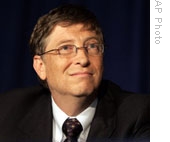-
(单词翻译:双击或拖选)
He leaves at a time of major changes in the computer industry. But over 90 percent of the world's one billion personal computers still use the Windows operating system. Transcript1 of radio broadcast:
03 July 2008
This is the VOA Special English Economics Report.
Last week, Bill Gates retired2 from full-time3 work at the world's biggest computer software company, Microsoft. He will remain chairman of the company he established with Paul Allen in nineteen seventy-five.
 |
| Bill Gates |
Mister Gates leaves Microsoft at a time of change in the computing4 industry. Microsoft grew at a time when personal computers, or PCs, were replacing big mainframe computers as the main computing tools. He showed that huge profits could be made in software as PCs increasingly were found "on every desk and in every home."
Early on, Microsoft understood the importance of the "network effect." That is, software is the kind of product that increases in value as more people buy and use it.
Now, free Internet software threatens to replace PC-based software. Devices like "smart phones" connect people to the Internet. Google has become a leader in Internet Web searching and advertising5. Microsoft has struggled to change with the new computer environment. Its efforts to sell music and its latest operating system, Vista6, have not been big successes. And an attempt this year to buy Yahoo for over forty-seven billion dollars failed.
In the last several years, Bill Gates has slowly given control of Microsoft to others. In two thousand, he gave the job of chief executive officer to Steve Ballmer, a friend of his since their years at Harvard University. Mister Ballmer has been with Microsoft since nineteen eighty.
Still, it is hard to overestimate7 the influence of Bill Gates on computing. He developed the business model that put the Windows operating system on about ninety percent of the world's one billion PCs. Microsoft now has almost ninety thousand employees.
At fifty-two years old, Bill Gates is currently the third richest man in the world. He is worth about fifty-eight billion dollars. He remains8 Microsoft's biggest shareholder9.
Mister Gates will now spend most of his time working at his charity organization, the Bill and Melinda Gates Foundation. The foundation is the world's largest charity with over thirty-seven billion dollars. It provides money for health, education and other projects, mostly in developing countries.
And that's the VOA Special English Economics Report, written by Mario Ritter. Transcripts10 and archives of our programs are at voaspecialenglish.com. I'm Steve Ember.
 收听单词发音
收听单词发音
1
transcript

|
|
| n.抄本,誊本,副本,肄业证书 | |
参考例句: |
|
|
|
2
retired

|
|
| adj.隐退的,退休的,退役的 | |
参考例句: |
|
|
|
3
full-time

|
|
| adj.满工作日的或工作周的,全时间的 | |
参考例句: |
|
|
|
4
computing

|
|
| n.计算 | |
参考例句: |
|
|
|
5
advertising

|
|
| n.广告业;广告活动 a.广告的;广告业务的 | |
参考例句: |
|
|
|
6
vista

|
|
| n.远景,深景,展望,回想 | |
参考例句: |
|
|
|
7
overestimate

|
|
| v.估计过高,过高评价 | |
参考例句: |
|
|
|
8
remains

|
|
| n.剩余物,残留物;遗体,遗迹 | |
参考例句: |
|
|
|
9
shareholder

|
|
| n.股东,股票持有人 | |
参考例句: |
|
|
|
10
transcripts

|
|
| n.抄本( transcript的名词复数 );转写本;文字本;副本 | |
参考例句: |
|
|
|















